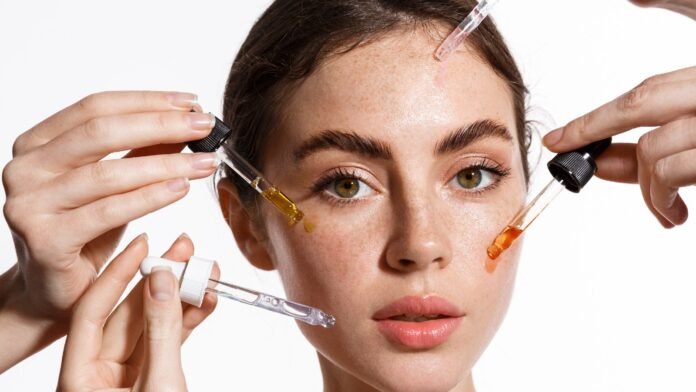After Indian actor Shefali Jariwala’s death, dermatologist Dr Sunil Tolat talks at length about glutathione risks and benefits for skin.
The unexpected death of Indian actor Shefali Jariwala at the age of 42 has prompted discussions about the dangers associated with glutathione injections used for skin-lightening purposes. According to media reports, Shefali – who gained fame through a dance video “Kaanta laga” and Bigg Boss 13 – underwent a glutathione IV treatment as part of an anti-ageing routine before her death on June 27, 2025. The precise circumstances of her death remain under investigation. Early findings suggest possible connections to low blood pressure, cardiac arrest, and gastric complications, potentially exacerbated by an anti-ageing (glutathione) injection administered on an empty stomach. This incident has put glutathione in the spotlight.
What is glutathione?
Glutathione is a skin lightening agent. It has antioxidant properties that can protect you from the damage caused by free radicals. It detoxifies the body and protects against cell damage.
It is a naturally occurring antioxidant composed of three amino acids: glutamine, cysteine, and glycine. It plays a crucial role in maintaining cellular health by supporting detoxification, enhancing immune function, and mitigating oxidative stress, as mentioned in the journal Antioxidants.
Glutathione itself is a well-tolerated antioxidant, but problems arise when it may be taken improperly or combined with other medications. This could be have been a concern in the death of Shefali Jariwala, as doctors have pointed out that multiple medications during fasting could have caused a sudden vasodilatory response or cardiac stress.
In light of this, Health Shots interviewed dermatologist Dr Sunil Tolat about the importance of maintaining health and safety when opting for any skincare treatment, particularly those that involve glutathione injections.
Excerpts from the interview:
Q. Can you explain how glutathione affects skin pigmentation and tone?
Dr Sunil Tolat: Glutathione plays a crucial role in melanogenesis by regulating several key biochemical mechanisms. It reduces the oxidation level of tyrosinase, a key enzyme involved in melanin production. It also helps detoxify the foreign chemicals to which your skin is exposed, as stated in the International Journal of Environmental Research and Public Health. For Shefali, combining glutathione with vitamin C has been shown to affect blood pressure and the immune system.
Q. Are there specific skin types or conditions that particularly benefit from glutathione treatments?
Dr Sunil Tolat: Glutathione is recognised as one of the most effective anti-ageing skincare ingredients. It has gained popularity as a skin-lightening antioxidant. Individuals with Fitzpatrick skin types III to V, who are more prone to pigmentation, often benefit most from glutathione-based treatments. It enhances the body’s defence system, combating oxidative stress, according to the journal Antioxidants.
Q. What forms of glutathione are available for dermatological use, and how do their effectiveness compare?
Dr Sunil Tolat: Primarily, glutathione is available in three primary forms of skin care: oral tablets, topical creams, and injectable shots. Glutathione injection yields faster results but carries a higher risk of side effects. Oral supplements are considered safer but slower; topicals help mildly with pigmentation when used consistently. As reports suggest, if Shefali was using injectables, especially while fasting, her body may have reacted sharply. The injectables are effective, but they must be administered with extreme care and never without supervision, as cautioned by the Centres for Disease Control and Prevention (CDC).
Q. What are the potential benefits of topical glutathione for treating skin conditions such as melasma or hyperpigmentation?
Dr Sunil Tolat: It is popular for treating melasma and hyperpigmentation because it helps keep the skin healthy by reducing stress caused by pollution and sun damage. The use of glutathione can help reduce the appearance of dark circles. However, excessive usage could result in reactions, which may have also occurred in the case of Shefali.
Q. How does glutathione contribute to the body’s antioxidant defence system?
Dr Sunil Tolat: Glutathione is an antioxidant found in our cells. It protects the body by neutralising harmful substances. It also keeps our skin healthy, slows down ageing and strengthens overall cell function. However, there may be potential side effects of glutathione in certain conditions. It is possible that Shefali Jariwala’s blood pressure dropped because she took the medicine on an empty stomach. This illustrates how even beneficial substances, such as glutathione, must be used carefully under medical supervision.
You may also like


Q. Are there any side effects or risks associated with glutathione treatments?
Dr Sunil Tolat: Glutathione is generally safe in moderate doses, but glutathione injection carries some risks. If combined with fasting, dehydration or other medications, sudden drops in blood pressure or allergic reactions are possible. Shefali’s sudden collapse highlights the dangers of glutathione in certain conditions.
Q. Can glutathione levels be measured through skin tests, or is blood testing more appropriate?
Dr Sunil Tolat: There’s no reliable skin test for glutathione. Only a blood test can show real levels in your body. Skin tone and appearance are not reliable indicators of one’s identity. Blood tests can measure both reduced and oxidised glutathione to accurately assess your antioxidant status, as shared in the journal Molecules.
Q. What questions should patients ask their dermatologist before beginning a glutathione-based treatment?
Dr Sunil Tolat: Before treatment, consider asking these questions:
- Do I need a blood test first?
- Is glutathione safe for my current blood level and health conditions?
- Should I take glutathione orally, topically, or through injection?
- What precautions should I take for food?
Q. How does diet influence glutathione levels in the body, and what foods are recommended to enhance its production naturally?
Dr Sunil Tolat: Glutathione is naturally produced in the body, and diet plays a crucial role in boosting its levels. Food rich in sulfur, such as garlic, onions, broccoli, spinach, turmeric, and walnuts, helps build glutathione. Vitamin C-rich fruits, such as oranges and berries, also support its activity according to The Nutrition Source. Click to know more on glutathione-rich foods.


